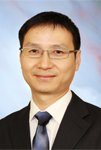Management assistant professor studies cultural differences in business
When Shengsheng “Charlie” Huang moved to the U.S. to work toward a doctorate in management from Rutgers University, he encountered a different way of doing business.
Huang, an assistant management professor in the University of Houston-Victoria School of Business Administration, earned a master’s degree in Hong Kong and had worked for businesses in China, where he was born. He was familiar with the work culture in both places.
“I found a big difference in the United States,” he said. “The distinctions in business culture were really intriguing to me.”
Huang began his career in China as a copywriter for an advertising agency. He eventually worked his way up to planning director.
In his experience, companies in China tend to be relationship-based, while companies in the U.S. are task- and goal-oriented. Those differences were affirmed by research Huang conducted about multinational corporations.
In China, employees tackle most projects as a team, and personal relationships among coworkers are encouraged as they are thought to bring harmony and efficiency to the workplace, Huang said. This focus on relationships, however, makes it difficult to reassign or replace people.
In the U.S., employees are expected to fulfill their job descriptions as laid out by their bosses and meet certain performance standards. Essentially, each worker could be substituted with another, more efficient one.
Besides intellectual curiosity, Huang said he left his business career behind to pursue teaching and research because he wanted to create a source of knowledge for companies engaged in working across cultural lines.
For business people, realizing that a partner halfway around the world doesn’t operate within the same culture is important, Huang said. Having that knowledge can lead to more efficient and practical outcomes.
“Cross-cultural literacy is really significant,” he said.
With his experience working in both China and the U.S., Huang offers a bridge for his students. His own cross-cultural experience has influenced his work and teaching, he said. He aims to integrate his knowledge of both cultures into real-world scenarios for his students in his courses, which include “International Management,” “Strategy and Business Environment” and “Strategic Management.”
In “Strategic Management,” the Bachelor of Business Administration capstone course, teams of students complete an analysis of a specific company and present it at a conference. The analysis is a test of the students’ critical-thinking skills and business acumen.
“The course is really tough for students,” Huang said. “But at the end of the challenging semester, students realize that they have learned a lot to help them go higher and do better in future.”
Outside of work, Huang enjoys taking his family on trips to state and national parks. Recently, they went to a rodeo in Houston.
At work, he remains dedicated to his research about cross-cultural relations and business management.
“When I’m not teaching, I’m working on the topics I’m researching,” he said.
Faculty Feature is an online feature highlighting faculty members from each of the University of Houston-Victoria’s three schools. To nominate a faculty member, contact Jeremy Shapiro, UHV communications manager, or call 361-570-4296.
The University of Houston-Victoria, located in the heart of the Coastal Bend region since 1973 in Victoria, Texas, offers courses leading to more than 80 academic programs in the schools of Arts & Sciences; Business Administration; and Education, Health Professions & Human Development. UHV provides face-to-face classes at its Victoria campus, as well as an instructional site in Katy, Texas, and online classes that students can take from anywhere. UHV supports the American Association of State Colleges and Universities Opportunities for All initiative to increase awareness about state colleges and universities and the important role they have in providing a high-quality and accessible education to an increasingly diverse student population, as well as contributing to regional and state economic development.
Sky Chadde, special to UHV





